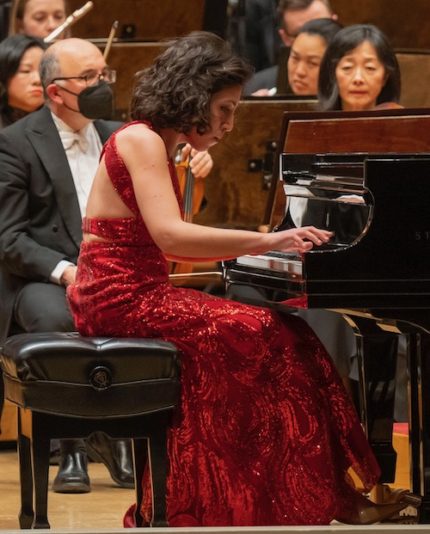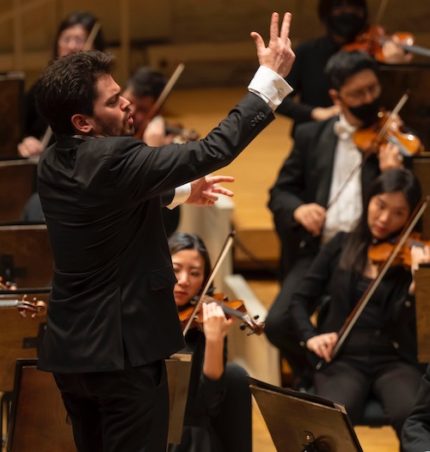CSO returns and marks Rachmaninoff 150 year with two debuts

Back from an extended North American tour, the Chicago Symphony Orchestra is doing its part to kick off the 150th birthday anniversary year of Sergei Rachmaninoff (1873-1943). Thursday evening’s Russian program presented two of his late works with conductor Lahav Shani and pianist Beatrice Rana joining the orchestra in their CSO debuts.
The music of Rachmaninoff hardly needs a special occasion for performances. Few composers are as beloved by audiences and musicians alike nor programmed with such seasonal regularity.
Some snobs still cavil at Rachmaninoff for his popularity as well as his lush melodic appeal, orchestral brilliance and excitement. Come on, man. His music is justly renowned not only for those reasons but because it is expertly crafted, masterfully scored and, often, ingeniously constructed. Has any thematic inversion ever produced anything as glorious as the 18th variation of his Rhapsody on a Theme of Paganini?
That work was the centerpiece of Thursday’s program and rightly so for historical and practical reasons. As CSO archivist Frank Villella points out in his program note, Rachmaninoff was a regular CSO guest from 1909 when he performed his Piano Concerto No. 2 with Frederick Stock conducting and took the podium himself to lead his Isle of the Dead. Rachmaninoff’s final appearance with an orchestra took place in Chicago in February of 1943 when he performed his Rhapsody and Beethoven’s Piano Concerto No. 1 with the CSO, just six weeks before his death.
Amazingly for such a popular work, the Rhapsody hasn’t been played by the CSO at Orchestra Hall for 26 years.
Beatrice Rana seemed like an ideal choice to revive it for her CSO debut. A Silver Medal winner at the 2013 Cliburn Competition, the Italian pianist has lately been making the rounds of major American orchestras, including the National Symphony Orchestra last week and the Boston Symphony next week.
Rana clearly possesses a stellar technique and handled all the considerable technical challenges with note-perfect accuracy and daunting power. The concluding section was taken at a fast clip delivering the requisite fire and bravura.
And yet overall, her performance left a mixed impression. Rana’s hard playing and edgy, staccato style seemed better suited to Prokofiev than Rachmaninoff. In the slower variations, she often brought out the fantasia-like expression, yet the famous 18th variation was curiously tepid, impatiently phrased and not remotely the heart-stopping moment it should be. Overall, an essential expressive warmth and Romantic spirit were largely missing in action.
Shani’s direction of the orchestra was similarly uneven. Balances were off—the opening bars sounded like a concerto for snare drum—and the orchestral side was heavy and lumbering rather than delivering the quicksilver brilliance the score demands. Amid the harsh and raucous tuttis, David Cooper’s elegant solo horn playing provided some welcome balm.
The inevitable standing ovation brought Rana back out for a unique bonus, with Shani joining her at the keyboard for a four-hand “Dance of the Sugar Plum Fairy” from Tchaikovsky’s The Nutcracker. The duo encore was dispatched with a light touch and charm, qualities that would have also benefited the main works on the program.

Prokofiev’s “Classical” Symphony led off the evening. The Israeli conductor—appointed music director of the Israel Philharmonic Orchestra in 2020 at age 31—led a rather burly account of this score; enjoyable enough but again favoring volume and whipcrack fortes at the expense of the music’s wit and piquancy. Flutist Stefán Ragnar Höskuldsson helped fill the void with some quirky backspin in his solos.
Like the Rhapsody, Rachmaninoff’s Symphonic Dances hails from his late years (1940) and was his last major completed work. The three sections offer Rachmaninoff’s brand of melody but with slenderized textures and fresh palette of colors and instrumental timbres. The Symphonic Dances seem to mark a private coming full circle with the motto theme from Rachmaninoff’s unsuccessful Symphony No. 1 making a reappearance at the end of the first movement. Ultimately, if not quite adding up to more than the sum of its three intriguing parts, this shadowy and restless work can still be a compelling experience.
From Shani’s unsubtle conducting in the first half, one expected more deafening volume, and it indeed was there in spades in the clamorous final bars. But the conductor—eschewing tuxedo for the informal cool of a well-tailored suit sans tie—also showed a more layered approach to this demanding score.
The first of the three dances is marked “not fast” (Non allegro) and, unlike many, Shani took the marking at its word, with a spacious approach that benefited the music. The final dance was exciting, if overloud, and Shani let the concluding gong resound until it finally faded into silence. Making their first appearance of the night, principals William Welter and Stephen Williamson made every oboe and clarinet episode sparkle, respectively.
Yet for all the polish of the playing, much of the performance seemed generalized, literal and strangely uninvolving. The haunting saxophone solo of the opening dance was bland and expressionless and the amorphous rendering of the spectral waltz conveyed little of its eerie, unsettling atmosphere. One wondered if Shani’s podium style—batonless, with graceful but approximate hand gestures—accounted for the lack of focus in the performance.
The finale went best but even here the alternation of material felt episodic at times and Shani kept on the near side of loud whenever possible. Let’s hope for better Rachmaninoff to come in this sesquicentennial year.
__________
The CSO has made few Rachmaninoff recordings over its long history but four decades ago, the young Cecile Licad recorded both the Rhapsody and the Piano Concerto No. 2 with Claudio Abbado conducting (CBS/Sony). Both performances still rank among the finest ever made of either work and are well worth seeking out.
Along with the recording, the Second Concerto was programmed at CSO concerts and I was fortunate enough to attend one of those performances. Abbado, then principal guest conductor, placed the Rachmaninoff on the second half with Stockhausen’s Gruppen (for three orchestras) on the first half.
That kind of audacious programming will not pass this way again.
The program will be repeated 8 p.m. Friday and Saturday. cso.org
Posted in Performances

